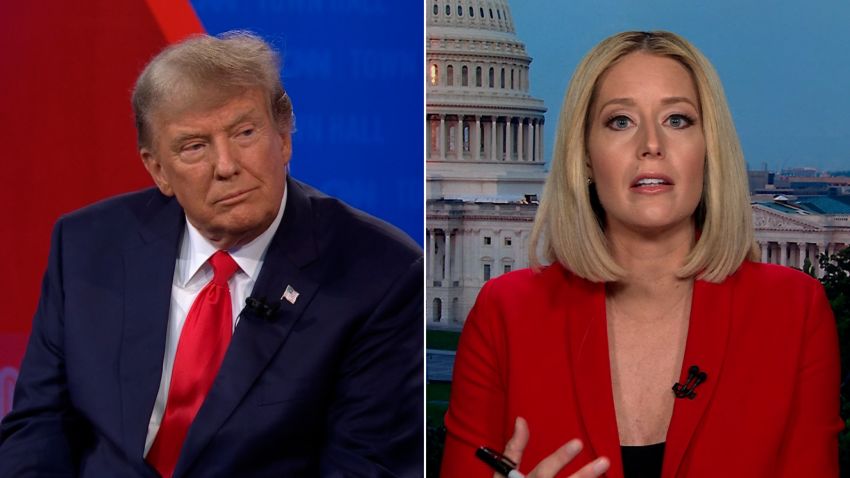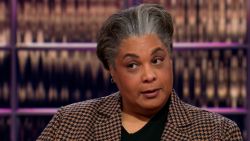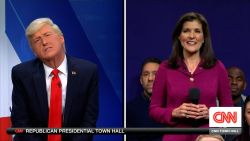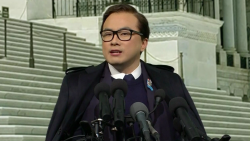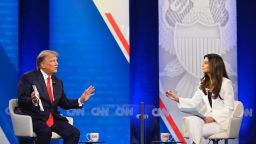Editor’s Note: A version of this article first appeared in the “Reliable Sources” newsletter. Sign up for the daily digest chronicling the evolving media landscape here.
It has been one week since CNN’s town hall with Donald Trump — and the fierce fallout stemming from the event is still reverberating.
While accepting the prestigious Columbia Journalism Award and serving as the school’s 2023 commencement speaker, Christiane Amanpour on Wednesday became the first network anchor to publicly voice dissent with management over the town hall, which has spawned a storm of fierce backlash.
Amanpour, CNN’s chief international anchor, disclosed that she had met with CNN boss Chris Licht this week and that the two “had a very robust exchange of views” about the matter. She said that Licht “welcomed that exchange of views,” but stood by his decision to hold the town hall. Licht told staffers the morning after the event that he believed it was worthwhile because it woke people up to the stakes of the 2024 election.
After hearing out Licht, Amanpour told the Columbia Journalism School graduates that she had not been moved.
“I still respectfully disagree with allowing Donald Trump to appear in that particular format,” the veteran anchor said, contending that the American people had demonstrated with their votes in the last three elections that they are well aware of his behavior.
“I would have dropped the mic at ‘nasty person,’ but then that’s me,” Amanpour candidly added, recounting the moment when Trump lashed out at moderator Kaitlan Collins for asking a question that he did not like.
Inside CNN, Amanpour is far from alone in her views. In private, the town hall has been widely criticized by employees at all levels across the organization. Some of these employees believe that Trump wasn’t worthy of a town hall platform after leading the insurrection on the US Capitol and continuing to spew dangerous lies about the 2020 election. Others believe that it was a worthy endeavor to confront him, but that the event was poorly executed.
Ahead of Amanpour’s address, Licht sent a note to the network’s global workforce of more than 4,000 employees, praising the anchor for the “rare and exceptional honor” and encouraging them to tune in. A CNN spokesperson said Licht was aware she planned to address the town hall in her speech.
During the address, Amanpour acknowledged that the press still has not quite figured out how to grapple with Trump, who has abused media platforms to spread dangerous disinformation far and wide, often overwhelming fact-checkers who have struggled to keep up with his rapid-fire stream of lies and falsehoods.
“Maybe we should revert back to the newspaper editors and TV chiefs of the 1950s, who in the end refused to allow McCarthyism onto their pages,” Amanpour suggested. “Unless his foul lies, his witch hunts and his rants reached the basic evidence level required in a court of law. His influence gradually decreased with all but his fervent colleagues and cults.”
“So maybe less is more,” she suggested. “Maybe live is not always right.”
“Some of the very best and even most fiery, compelling interviews are, in fact, taped and they are edited, not to change the context or the content or the truth or the intent, but to edit for filibuster and a stream of disinformation,” Amanpour added.
The award-winning anchor also described the raucous town hall audience — which cheered Trump on as he mocked sexual abuse claims — as part of the problem. It was CNN’s venue, she contended, and should not have allowed for the jeering and cheering.
Licht conceded to her “the execution” of the town hall “was lacking a little,” she said, and he assured her that “we will not witness that same appalling behavior in future town halls.”
Amanpour defended CNN as an institution and implored people to give the news organization another chance, even as she acknowledged it “doesn’t mean we always get everything right.”
“I can only hope that your trust in us might have been shaken, but not shattered,” she said. “That you believe we can survive and rebuild that trust.”
Amanpour also spoke about her decades-long career and how it had informed her belief that journalists must provide the public clear-eyed coverage. She noted, for example, that newsrooms recognize Ukraine “is the victim of a Russian imperialist illegal aggression,” instead of giving false equivalency to each country’s claims.
“Be truthful, but not neutral,” Amanpour urged. “Bothsidesism is not always objectivity. It does not get you to the truth. Drawing false moral or factual equivalence is neither objective or truthful. Objectivity is our golden rule and it is in weighing all the sides and hearing all the evidence, but not rushing to equate them when there is no equating.”
“There is a 100% connection,” she said, “between a robust, independent, free and fair press and a functioning democracy and the advance of human rights and justice.”
Amanpour said the angry debates over Covid-19 vaccines and the 2020 election results are proof that Americans now have difficulty believing basic facts. She indicated that it is the job of the press to cut through the noise, counter disinformation, and summon the public back to reality.
“I refuse any more to say or to concede that we live in a post-truth world because that is lazy and it is ultimately a self-fulfilling prophecy,” Amanpour said. “We need to seek to provide and defend the truth.”

